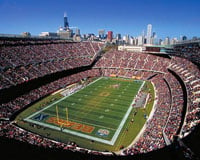From the “Friday Night Lights” of high school football to the Super Bowl, sports draw people in. They serve as a fun escape from everyday life, and in many cases, represent some of the biggest passions in people’s lives. This is showcased by the incredible volume of fans, stadiums and sporting venues across the world see on a weekly basis.
When these sports-crazed fans file into the stadium, field, or arena, their focus is typically on whether their favorite team can bring home the win or not. What they don’t realize, however, is all of the work outside of the sports team that goes into making their experience safe, fun, and worth their money. We’re talking about the operations and communications staff in the venue.
As part of an event or game day crew, you have a tough job: ensure everything runs smoothly and on schedule, answer questions for the fans, and most importantly, keep everyone safe. Thankfully, the technological advancements over the past decade have provided innovative tools for those in this field - one of the best being digital two-way radios.
There is a good chance that your operations and security teams are already using some form of device to communicate with one another. It may be an analog radio or even a smartphone. While these devices are often enough to hit the bare minimum for communication, they often don’t do the job quite well enough.
If you are looking to improve your stadium or venue communication and operations, here are are 5 reasons digital two-way radios are right for you.
1) IP Technology
Did you know that digital radios actually transmit data via Internet Protocol (IP)? They encode transmissions into digital data that can be sent between devices. This means that you can seamlessly integrate your radios into your entire IT infrastructure, as your radios will be able send data to perform tasks (things like turning on security cameras or even unlocking doors).
2) Noise-Cancelling Technology
Many two-way radios offer a feature known as “noise-cancelling technology.” This is exactly what it sounds like - the microphone in the radio focuses in on the speaker’s voice and blocks out external noises and sounds around them (screaming fans, anyone?). This means that regardless of where your staff is the in the stadium, they will be able to communicate with each other even over the roar of a crowd.
3) Elevated Security
Since digital radios have encryption technology built right in, they serve as an excellent communication tool, especially for those in stadium security. For larger events, security teams today have to be critically aware of any potential threats, ranging from intoxicated fans to gun or bomb threats. They cannot afford to have anyone listening in on their communication who shouldn’t be.
4) Integrated GPS
Digital radios can actually receive data from GPS satellites, meaning your staff can always know where each other are during an event. While not every sporting event is as big as the Super Bowl or World Series, many are large enough to warrant location-tracking technology for their operations and security teams.
5) Long-Lasting Battery Life
If your team is using older analog radios or relying on smartphones for game day communications, chances are you’ve seen your battery die one too many times. Digital two-way radios are built for long stretches of use, so you and your team can get there hours before the event to setup, communicate throughout, and stay late into the night to lock up, all without needing to recharge your radio.
To learn more about using two-way radios for your team, contact Chicago Communications today, or, leave a comment/question below!



